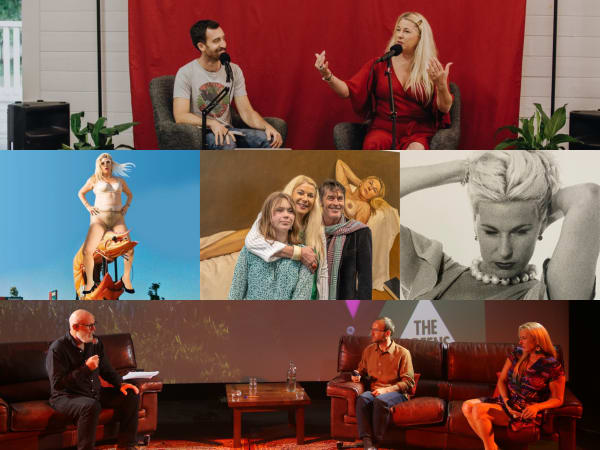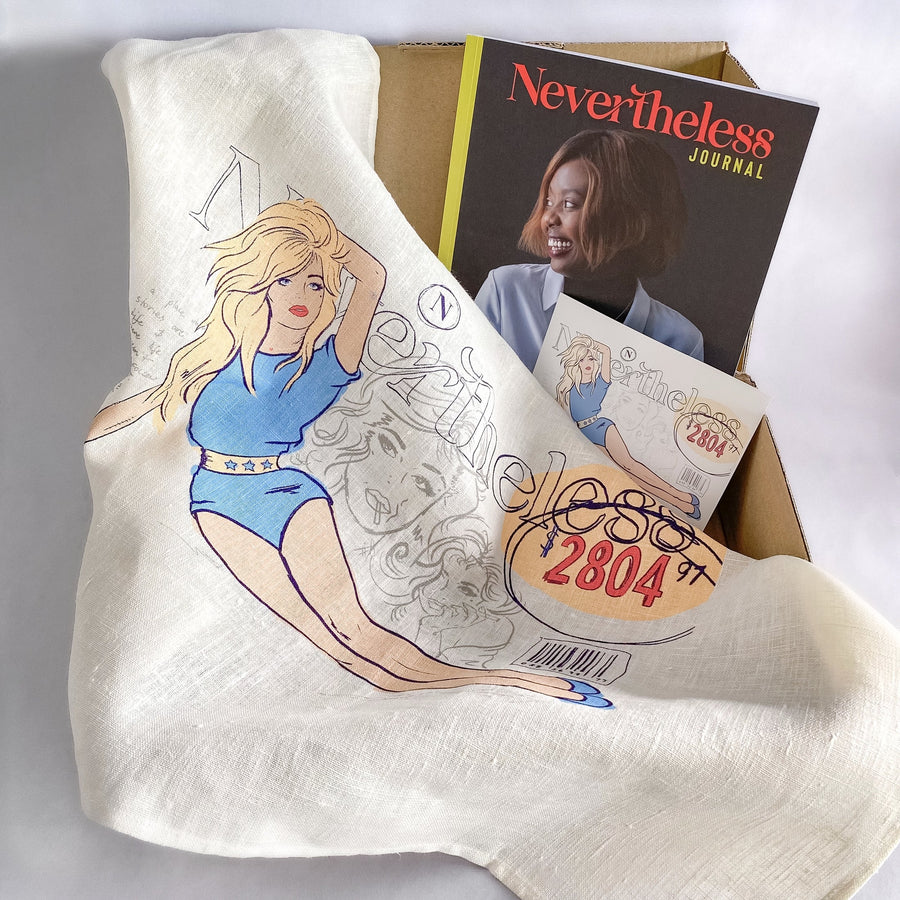The extraordinary life of Mandy Nolan

Words by Natalie O'Driscoll
Comedian, writer, lover, activist, mother, disrupter and... politician? Mandy Nolan has really run the gamut, or at least she’s about to, if she’s got anything to say about it. And she usually does.
Wherever Mandy Nolan is known, she’s extremely well known. Not one to hold anything back, this renaissance babe has forged a fascinating and varied career from not much else but a bright, sharp mind, a pathological sense of authenticity and a yen for making people think, laugh and think again.
Read her book ‘Boyfriends We’ve All Had (and Shouldn’t Have)’ and you’ll get a good idea of what Mandy's like in real life. Incisive, hilarious, passionate, confident, and not afraid to own her shit. Someone you can sit down and have a rollicking good time with, and someone who can command a room. She’s a big presence.
Of course, all the stars in the universe had an explosive start, and Mandy is no different.
Forty plus years ago, the town of Wondai in the Southern Burnett region of Queensland was one of those places that always looked better from the rearview mirror. Full of that cliched conservative, nationalistic, white Australia vibe that is better consigned to the annals of our nation’s embarrassing history, Wondai was an odd fit for the socially progressive family unit that Mandy was raised in.
“I was brought up in a family that had strong values around social justice,” says Mandy. “We were the only Labor voters in the whole town I think.”
Mandy’s father, while outwardly charming, kept his whole family walking on eggshells behind closed doors with his temper, volatility and physically violent outbursts. He died in a car accident when Mandy was six, and from there, Mandy’s mother really came into her own.
“My mum was a hairdresser in a country town that went back to uni and became a community development worker,” Mandy recalls. “My mum embodied her values completely. She was the one that people in Wondai came to that was like a therapist before there were any therapists.
“We were the safe house for anyone who identified as gay, or whatever stuff was going on with them. I remember overhearing bits of conversations and understanding from a really young age that there was this broadness to people’s experiences, and that some people are marginalised because of it.
“We were the safe place for those people."
>>> Shop all things Nevertheless
When the opportunity came to get the hell out of dodge and go study in Brisbane, Mandy took it. There, at the University of Queensland in 1985 she really found her people, getting instantly and heavily involved in performance, activism and feminism.
“We marched every Friday because it was a hotbed of political activity. A lot of my lecturers were openly socialists, and they encouraged the student body to join the worker disputes, like with SEQUEB.
“It was the end of Joh Bjelke-Peterson and he was trying to crush the unions. It was good to be a part of the movement where students marched alongside the working people, you don’t really see that anymore.”
Of course, study formed a part of the experience, too. But Mandy’s meandering Bachelor of Arts was more of a continuance of her personal development than anything that was going to end up in a career. In a move that would pretty well characterise her life choices moving forward, she followed her heart through journalism, drama, philosophy, sociology, psychology and English, before leaving uni with enough credits for a couple of Bachelors and no actual degree.
Uni is also where Mandy’s love for performance and activism found an outlet in The Ugly Sisters, a comedy cabaret troupe with a feminist bent. It was there Mandy told a story about her first period (“so embarrassing”, she cringes) and got a few laughs.
“Someone saw me that night then booked me for a show,” she explains. “And you know in stand up comedy a lot of people work hard for a long time without getting paid, so I hate to say it, but I got paid from the first minute.
“I never went out looking for work. There was probably a time when I was cute and funny and most of the time I think I was terrible, but I’ve got a lot of confidence and so I think that’s why people kept booking me.
“Now you can just google someone to book them but back then I lived in a share house with five girls and people would have to come up after a gig, get your number, ring you. It’s funny I don’t even know how my career started, it’s like pigeons were dropped,” she laughs.

Mandy also credits aspiring poets with her running start in comedy.
“I was performing at the end of these poetry nights with all these upcoming poets, and I’ll tell you what, if you want to look good, go up after an hour of poetry and you’ll look like genius.
“Nothing against poetry of course,” she demurs. “But the gap between amazing poetry and ordinary poetry is fucking huge, and the audience by the time I got up would be so ruined they’d be like ‘wow this girl is amazing’, so really, I have a lot to thank those poets for.”
Stand up comedy still skews male-heavy today, but back when Mandy started out, women on the circuit were like hen’s teeth.
“Even as a young feminist it didn’t occur to me that one of the biggest battles I would be fighting would be trying to succeed in a male dominated-industry,” says Mandy.
“Audiences didn’t like women comics. I’d walk on stage and you’d hear people groan. They trusted men but they were nervous about women. I was usually the only woman on the bill. You’d follow after all these guys doing jokes about women and it wasn’t easy.
“Just being there was a feminist act. Just being heard, visible, validated. There was this persistent idea that women aren’t funny which seems like an unbelievable thing to say now, but 20 years ago when people interviewed me they would say that and I’d just roll my eyes and say ‘of course not, we’re just decorative’.
“It’s was men’s job to be funny and women’s job to laugh at the jokes. Or be the butt of the jokes. Turning that on its head felt powerful. It took me a while to learn how to use that power.”
Of course, the industry has changed since then.
“It’s good now. Audiences are more discerning. Comedy isn’t great these days for some sexist bigot that just wants to get up and tell homophobic jokes, but if you have something to say that is thoughtful, not a cliché or a stereotype, people are interested.
“And I couldn’t love the male colleagues I work with more. They’re all great and supportive and it’s just a non-issue.”
As for other men in her life, Mandy, determined as she was to be an unconventional free spirit, ended up with three great loves, two of them husbands. She never wanted children, and had three terminations before falling pregnant for the fourth time at 27, while living the full hippie lifestyle in a shed.
“When I got pregnant I said to my partner at the time ‘do you wanna have kids in your life?’ and when he said yes I thought okay maybe I should have this one, and that’s how it started. And after more relationships and marriages I ended up with five!” she laughs.
Raising those five kids took up a lot of space and energy, and although she toured and performed and spoke and wrote consistently, by the time the last child, who is still at home, was mostly self-sufficient, it was time for Mandy to look at the next step. Politics seemed like a natural choice.
“I’ve always been really engaged and connected with my community on a range of issues,” says Mandy. “And I’m certainly not afraid of speaking up.”
With the backing of her family and her close knit Northern New South Wales community behind her, Mandy decided to run for the seat of Richmond as a Greens candidate in the most recent Federal election. She very nearly won it, too.
“Looking at the figures, it looks like we only needed about 1.5% more of a swing,” she recalls. “It’s so hard, putting yourself out there like this. Because everyone knows what it is that you want. You’re so exposed, and when you don’t get it, it’s just devastating.
“I can’t even explain to people how exhausting, how consuming an election campaign is.”
Nevertheless, Mandy intends to contest for the seat again.
“Why I do comedy, why I write, why I do everything is always because I want to give a voice to the unsaid, to the marginalised ideas or people or communities,” she says. “That’s the most important thing to me. And getting into politics was exactly about that for me.”
“I’m just going to keep getting in there like I already do, stay engaged, speak at rallies, organise things for the community hall and flood relief and just do what I do best which is getting in at the grassroots level with my community and help to bring their voices forward. Next time, there might a different result.”
If anyone can do it, Mandy can.


